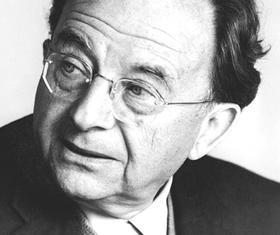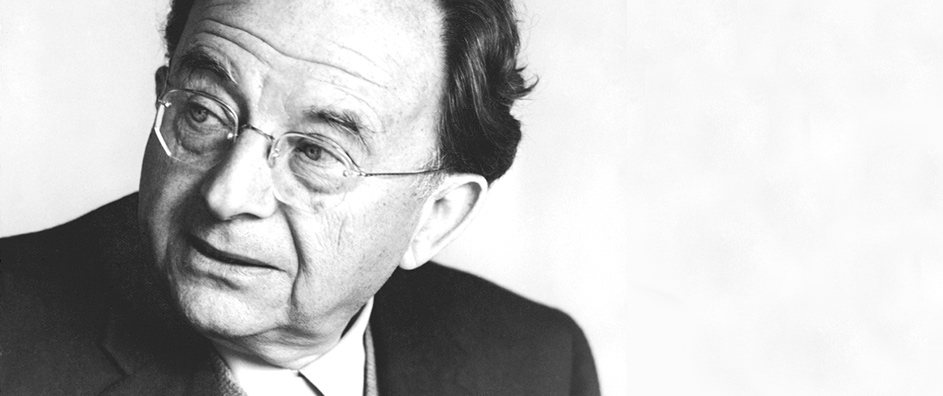The views expressed in our content reflect individual perspectives and do not represent the authoritative views of the Baha'i Faith.
…religion is for the unification of mankind. True religion is the source of love and agreement amongst men, the cause of the development of praiseworthy qualities, but the people are holding to the counterfeit and imitation, negligent of the reality which unifies, so they are bereft and deprived of the radiance of religion. – Abdu’l-Baha, The Promulgation of Universal Peace, p. 179.
A Baha’i since my youth, I have always been fascinated by the opinions of the intellectually and spiritually accomplished regarding the Baha’i Faith, the latest major revelation from God, brought to the world by two Prophets, Baha’u’llah and his forerunner, the Bab.
Recently, a passage in the well-known humanist philosopher Erich Fromm’s The Sane Society came to my attention through some alert friends: Ismael Valesco, Carol Rustein, Dr. Robert Stockman, and Dr. Udo Schaefer. Fromm’s passage teaches us both what we should and should not conclude when we discover something that reads as if it has been literally lifted from the Baha’i sacred writings.
Now I happen to have Fromm’s book in my library. But somehow I didn’t get around to reading it carefully, and so, until now, I had missed his significant prediction of a coming future world religion:
….In fact, for those who see in the monotheistic religions only one of the stations in the evolution of the human race, it is not too far fetched to believe that a new religion will develop which corresponds to the development of the human race. The most important feature of such a religion will be its universalistic character, corresponding to the unification of mankind which is taking place in this epoch; it would embrace the humanistic teachings common to all the great religions of the East and of the West; its doctrines would not contradict the rational insight of mankind today, and its emphasis would be on the practice of life, rather than on doctrinal beliefs.
Such a religion would create new rituals and artistic forms of expression, conducive to the spirit of reverence towards life and the solidarity of man. Religion can, of course, not be invented. It will come into existence with the appearance of a new great teacher, just as they have appeared in previous centuries when the time was ripe. In the meantime, those who believe in God should express their faith by living it; those who do not believe, by living the precepts of love and justice and–waiting. – The Sane Society, p.352.
Fromm’s vision of a future world religion is so remarkably close to the Baha’i Faith that one suspects a direct connection. The Baha’i parallels are just too blatantly obvious: evolutionary development, a unified humanity, progressive revelation, a new teacher, an emphasis on spirituality rather than doctrine, the harmony of faith and reason, etc. Scholar Ismael Valesco alleges, in fact, that Fromm had a Baha’i correspondent:
The source is Kosher. I heard it many times from Hugh McKinley himself, and I am working on his biography… [McKinley was one of the first Bahá’ís to settle on Cyprus]. McKinley, was living in a little Greek island and writing the literary column of the Athens Daily Times. He reviewed new books in it, and took the opportunity to correspond with their authors, striking solid friendships with great figures such as Kathleen Raine, Helen Shaw and May Sarton. One of these exchanges took place with Erich Fromm, in which Hugh questioned Fromm’s dismissal of religion, and engaged in a debate that led Fromm to change his treatment of the subject subsequently.
Was the avowed atheist Erich Fromm endorsing the Baha’i Faith as the religion of the future? The answer to that question is probably not. Let me amplify Valesco’s statement of Fromm’s “dismissal of religion.”
The roots of Fromm’s thought lie in psychoanalysis and Marxism. Although he rejected Freud and his psychoanalytical theory as being too repressive and too bourgeois, his admiration for Marx remained complete. (See Fromm’s Marx’s Concept of Man, 1961). He based his entire psychological outlook on a merger of Marxism and psychoanalysis.
Erich Fromm grew up in a devout, orthodox Jewish home. But early on, he renounced not only Judaism but all religion. Like many intellectuals who see only the dark side of religion, Fromm believed that religion had divided humanity and had done more harm than good. He also had a horror of totalitarian systems, having fled Nazi Germany to come to the United States. For him, religion was a repressive, totalitarian system that stifled the freedom of individual conscience. The new teacher of the age who Fromm envisions is not a theistic prophet, one who speaks on behalf of God, but a humanistic teacher like Marx, who Fromm believed would spread an enlightened ideology.
However, the theistic reader could make an alternate reading of Fromm’s passage. It could be read as his concession to the validity of the unnamed Baha’i Faith and its progressive teachings. And for that, we would have to thank Mr. Hugh McKinley.
You May Also Like
Comments



















when they do encounter the Baha'i teachings, will perhaps come to the right conclusion as to the source of Fromm's "endorsement" of the religion of the future.
-------------------------------------------------------------------------------------------------------------------------------------------------------------------
Part 1:
Erich Fromm(1900-1980) was a theorist who brought other theories together. He also emphasized how one's personality is embedded in class, status, education, vocation, and religious and philosophical background, among other social determinants. Fromm held the view that humans need to live and feel part of a genuine community for this community functions to change the people in it. In some ways I have often thought that the Baha'i Faith is going to operate inversely, if that is the right word, to Christianity. Christianity tried to change the society, and it did, by changing the individual; whereas the Baha'i Faith, as it progresses into future centuries, will change individuals by changing society. Of course, this dichotomy is not a simple one, but contains within it much nuance and complexity.
Fromm was a medical doctor and practicing psychiatrist; he explained people's drives in terms of their social interaction, their life in community. Mental illness was thus explained in terms of the failure of the individual to relate properly with other individuals. The role of biological and genetic determinants in mental health problems and individual behavior was not part of his focus, although it has become part of mine as I look back over seven decades of living.
Since my autobiography and my personality is embedded to a great extent in the same factors that Fromm describes and, since I have come to the view that this same autobiography and personality is also a result of biological and genetic factors, it is timely to say a few words about Erich Fromm's ideas in this prose-poetic.
Part 1.1:
Erich Fromm is known not only as an author and significant humanist of the 20th century, but also as a psychoanalyst and social psychologist. Erich Fromm affected the world like almost no other German-born social scientist. His writings and realizations are read and recognized worldwide. The International Erich Fromm Society now works to maintain, to research, to develop further, and to pass on Erich Fromm’s scholarly findings and ideas as the fitting continuation of his international work and in recognition of his worldwide significance. It has been more than 50 years since I first began reading Erich Fromm, and I thank Jack McLean for reminding me of Fromm's 1955 book Sane Society which I also reading in my five tumultuous years of post-secondary education.
The year I began my pioneering experience, 1962 at the age of 18, Erich Fromm, American psychoanalyst and prolific writer in the field of
existential psychology, stated his 'credo' in his book "Beyond the Chains of Illusions." I have written some of his Credo below since it was consistent with my views back in 1962 and it still is. I have commented on some of his Credo expressing views, as that Credo did, that have remained part of my belief system during this lifelong travelling-and-pioneering venture spanning, as it does now, more than fifty years. I read Fromm's books for thirty years, from the 1960s through the 1990s.-Ron Price with thanks to Michael Maccoby, "The Two Voices of Erich Fromm: The Prophetic and the Analytic," Society, July/August 1994.
Part 2:
"The most important factor for the development of the individual is the structure and the values of the society into which he has been born." Given this fact, my role as a Baha'i has been to spend my life trying to build the kind of society fit for human beings to be born into. For, as Fromm says in his Credo, "society has both a furthering and an inhibiting function. Only in cooperation with others, and in the process of work, does man develop his powers, only in the historical process do humans create themselves." Fromm continues:
"Only when society's aim will have become identical with the aims of humanity will society cease to cripple man and to further evil." In attempting to transform society Fromm underestimated, it seems to me, the need for individuals to adapt to their society. For the Baha'i to be an effective teacher, propagator, and disseminater, of the values and beliefs, attitudes and norms, of this micro, this new, society which he or she is associated with, he needs to adapt to the larger, the macro, society in which he has been born and in which he lives his life. Many of the difficulties I had in my decade-long travelling-and-pioneering experience came, it seems to me in retrospect, from what was my slow adaptation to my society. As the decades followed one another though, with great speed it now seems in retrospect, my increasing effectiveness was due significantly to my more efficient adapting to my society.
Part 3:
This adaptive process is slow and arduous work and, for Baha'is, it takes place in the context of action toward goals using a map provided by the Founders of their religion and the legitimate Successors. "I believe that every man represents humanity. We are different as to intelligence, health and talents. Yet we are all one. We are all saints and sinners, adults and children, and no one is anybody's superior or judge. We have all been awakened with the Buddha, we have all been crucified with Christ, and we have all killed
and robbed with Genghis Khan, Stalin, and Hitler. Man's task in life is precisely the paradoxical one of realizing his individuality and at the same time transcending it and arriving at the experience of universality. Only the fully developed individual self can drop the ego." Perhaps this is one way of defining, of interpreting, the nature and experience of 'Abdu'l-Baha and some of the reasons for His effectiveness and efficiency in what were some very difficult communities in which He lived in the late 19th and early 20th centuries. -Ron Price, Pioneeering Over Four Epochs, 9 October 2002.
Part 4:
There is much truth here, Erich, and
I must thank you for your wonderful
and illuminating books, enriching(1)
as they did my life, & approximating
the jeweled wisdom of this lucid Faith,
a Faith that I set out with in '62 when I
moved to Dundas and began to pray
in those back streets on afternoons in
the small town to which I had moved,
to read from sweet-scented streams,
taste of the fruits of His tree in years
when my father's white hair blew in the
wind for the last time, my mother was
driven to the end of her tether, & that
charisma became institutionalized at
the apex of this wondrous, new Order.
(1) Erich Fromm, Beyond the Chains of Illusions, Simon and Schuster, NY, 1962, pp.174-182, and many other books to his last, published posthumously, in 1994.
Ron Price
9/10/'02 to 31/5/'14.
Part 4.1:
Freud’s life’s work had been devoted to understanding as fully as possible the world of man’s soul. To Freud psyche and soul were the same, conscious and unconscious mental life, although this subject is complex and highly nuanced. Psychoanalysis is the science of the soul. -Ron Price with thanks to Erich Fromm, The Art of Listening, Constable, London, 1994, p.75.
Part 5:
In the 15 August 2013 issue of The New York Review of Books Alan Ryan, in his article "The Art of Being Erich Fromm", he reviews a new book entitled: The Lives of Erich Fromm: Love’s Prophet by Lawrence J. Friedman(Columbia University Press,410 pages). Friedman begins his review as follows: "Some readers will recall being given a copy of Erich Fromm’s popular The Art of Loving in high school or college, usually remembering it with gratitude, but sometimes with a sense that its reliance on the ideas of Freud and Marx now makes it not only unfashionable, but old-fashioned." I was not given this book, but I read it while at university in the years 1963 to 1967.
"Still others may recall their first reading of Escape from Freedom," continues Friedman, "one of the earlier attempts to explain what became known as the authoritarian personality: it was provoked by astonishment that so many otherwise rational people followed leaders such as Hitler, but it was much more wide-ranging in its exploration of the fear of freedom & the longing to be dependent." I had also read that book in those 4 years at two universities in Ontario.
"Still others may remember Fromm as a political activist, prominent in the antiwar movement from the early 1950s, and visible for the last time on the public stage as an adviser to Eugene McCarthy during his campaign for the Democratic nomination for the presidency in
1967–1968." I was getting ready to teach Inuit kids at the time, and then recovering from teaching them back in those years. Erich Fromm was not on my horizons. But he kept coming back as the 1960s changed sensibly and insensibly into the 1970s, and then the 1980s and 1990s. Fromm will be with me, in one way or another, until I leave this mortal coil.